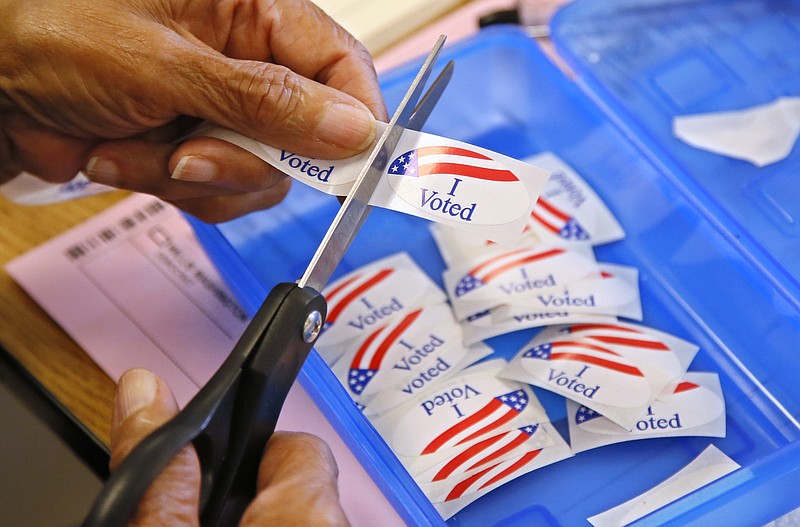Residents of Chickamauga, Georgia, are getting a say in how upcoming capital projects are initially funded.
Early voting runs through March 12 on a referendum that, if passed, would allow the city to use bonds to help pay for earmarked Special Purpose Local Option Sales Tax projects that were approved in November.
SPLOST payments happen monthly as the state divvies out sales tax earnings from the previous month. Having money up front would help the city start on major projects sooner, officials explained.
Bonds would provide upfront capital, and the city would then pay those loans back as SPLOST money rolls in, said Chickamauga City Manager Micheal Haney.
If approved, he expects to have the bonds by the end of the year.
"It's a way to help jumpstart, to get our projects going and get completed over the next five years instead of waiting five years," he said.
SPLOST is an additional 1-cent sales tax that provides funding for capital infrastructure projects. For the current cycle approved in June 2020, Chickamauga officials ID'd projects like improving the city's commercial district.
Using bonds to fund such projects isn't new to the city, though it's usually done through the county, Haney said, but the county's new administration decided against taking on the additional financial liability for cities this time around.
The bond vote would allow the city to take out up to $2.12 million in bonds, which have to be paid back in five years. Haney said the city expects to receive around $3.4 million in SPLOST money over the next five years, which would more than cover the bonds and their anticipated "relatively low" interest rate.
City of Chickamauga General Obligation Bond Referendum
"Shall the City of Chickamauga, Georgia (the "City") issue general obligation bonds in the principal amount of not to exceed $2,120,000 for the purpose of providing funds to (a) acquire, construct and install the following capital projects for the City: [(1) business district economic development and improvement projects, (2) street improvements, (3) utility system upgrades, (4) city parks, playgrounds and ballfields improvements, (5) government vehicles, garbage trucks, city emergency and utility communications and technology equipment, (6) government buildings renovations, equipment and technology upgrades, and (7) train depot improvements]; (b) pay capitalized interest on such bonds; and (iii) pay of all expenses incident to accomplishing the foregoing?"
"Now if the citizens vote it down [we'll] have to allow for the SPLOST to come in and slowly work on these projects as the money comes in," he said. "You're talking about projects, you know, that take quite a bit of money up front, and not only that, it gives us the buying power."
Being able to use bonds would also help the city secure grants that require governments to match allocated funds to receive money, he explained.
The city doesn't keep large reserves, and officials try to retain what is saved for unforeseen emergencies, said Haney.
"We don't like to deplete what we have in there. If we have a tornado, for instance, come through and take out our power grid that's our money to get us going," he said. "We have enough on hand to operate our budget about half a year if we had an emergency. Other than that, our reserves are not used to leverage for grants."
The bond issue is part of a special election taking place March 16. Also on the ballot is a countywide referendum on whether to continue funding the Education Special Purpose Local Option Tax, a 1-cent tax added to local purchases to help pay for projects for school districts such as new buses and facility maintenance.
Registered voters can cast their ballots that day from 7 a.m. to 7 p.m. - as can Catoosa County voters, who also have the chance to decide whether to continue ESPLOST on purchases made in Catoosa.
For more information on how and where to vote, visit mvp.sos.ga.gov/MVP/mvp.do.
Contact Tierra Hayes at thayes@timesfreepress.com
LaFayette special election canceled
Initially, Walker County was slated to have a third election in the city of LaFayette to fill a city council seat vacated after its former occupant, Joseph Massingill, moved out of the zoned area in November. But, because candidate Anthony Underwood is running unopposed to represent Ward 2, according to local law, voters are "deemed to have voted for him" and no formal election process will be held. Election assistant Chuck Fletcher said that having someone run unopposed for city council seats isn't unheard of, as the individual districts or wards that officials represent sometimes only cover a pretty small area. The seat will be up for election again in the fall when the term expires.
